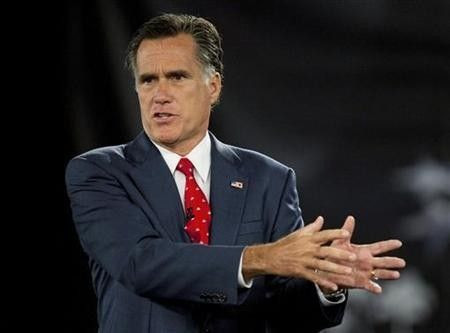Romney puts China squarely in presidential race

Republican presidential candidate Mitt Romney's threat to get tough with Chinese trade practices has moved China from the background to a potentially significant issue in the 2012 presidential campaign.
Pledging to label China a currency manipulator, Romney sought to outline differences with President Barack Obama and to tap into the U.S. public's rising concern over China's economic and military growth, as the United States remains saddled with an anemic economy.
China-bashing has in recent years been the province mostly of Democratic candidates. But this election cycle, it looks to be a more bipartisan affair.
Candidates are out there listening to voters, who are talking about these issues and they know that we are getting our lunch eaten by China, said Scott Paul, executive director of the Alliance for American Manufacturing, which has a major stake in trade with China.
Paul said a poll the group conducted in July showed that Republicans were as strong as Democrats in supporting more assertive U.S. trade policies toward China.
Comments like Romney's are generally cost-free at this stage of the race, but they underscore that there are constituencies on both sides of the aisle that feel that China is getting away with far too much by virtue of a range of mercantilist policies, said a China trade consultant, who spoke on condition of anonymity.
While China's growing role in the U.S. economy has brought it greater attention in U.S. politics, presidential campaigns don't usually lend themselves to intelligent, thoughtful discussion, the consultant added.
It remains to be seen whether the question of how to handle China's rise as an economic and military challenge will emerge full-blown as a top-tier U.S. campaign issue.
But Romney raised the stakes Tuesday, promising that one of his initial executive orders on his first day as president would be to clamp down on the cheaters by slapping duties on Chinese imports if China does not move quickly to float its currency.
I will label China as it is, a currency manipulator and I will go after them for stealing our intellectual property, he said while unveiling his plan to revive the troubled U.S. economy and create jobs.
Until Romney took aim at Beijing, China lurked in the background of the Republican campaign, in conservative attacks on Vice President Joe Biden's seemingly empathetic remarks about China's one-child policy last month, or as an issue for Jon Huntsman because he just spent two years as Obama's ambassador in Beijing.
One obscure Republican candidate, Buddy Roemer, gave a speech on jobs in front of China's embassy in Washington, quipping that Obama's worker retraining program should teach Mandarin because that's where U.S. jobs have gone.
But if Romney's point -- that China suppresses the value of its currency, the yuan, to keep its exports artificially cheap -- sounds familiar, that's because Obama and his rivals were making that argument in the 2007-8 Democratic primary race.
Romney finally said something. President Obama has been absent without leave on China, as has Rick Perry, said economist and well-known China critic Peter Morici of the Robert H. Smith School of Business at the University of Maryland.
REMEMBER REAGAN AND JAPAN
China's expanding economy and growing global clout, its rapidly growing military which in 2011 unveiled both a stealth fighter jet and an aircraft carrier, and its human rights record all cause anxiety for American voters, polls show.
So far the web sites and platforms of Republican candidates are very thin on specific trade policies for China.
The threat to force China to allow its currency to float to market rates has also been at the center of proposed U.S. legislation since 2005 that has been repeatedly shelved in favor of negotiations with Beijing.
President Obama has had five chances to name China as a currency manipulator, which they certainly are, and he's failed five times to do it, said the AMA's Paul.
Paul, who welcomed Romney's remarks, was referring to the twice annual report the Treasury Department submits to Congress on countries deemed to be manipulating their currencies. The Obama administration, like its predecessor, has demurred from naming China as a manipulator.
A spokeswoman for Treasury declined to comment on Romney's proposals on China's currency.
The Wall Street Journal, in an editorial Wednesday which largely panned Romney's economic plan as too timid, said his call to confront China was by far the most troubling proposal and sounded like a Democratic Party theme.
The newspaper warned that giving Americans the impression that a trade war will bring those jobs back to the U.S. is offering false hope.
But Paul recalled that an earlier, well-known free-trade Republican did not demur from a tough trade stance.
President Ronald Reagan was for free markets but he was willing to take on Japan on semi-conductors and, famously, the value of the yen, he said.
© Copyright Thomson Reuters 2024. All rights reserved.





















